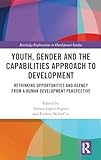Youth, Gender and the Capabilities Approach to Development : Rethinking Opportunities and Agency From a Human Development Perspective
Contributor(s): Cin, Firdevs Melis | Lopez-Fogues, Aurora.
Series: Routledge Explorations in Development Studies. Publisher: London Routledge 2018Description: xx, 194p.ISBN: 9781138234680.Subject(s): Education -- Young Women -- Developing Countries | Sociology -- Education | Educational -- EqualizationDDC classification: RR 306.430724 Summary: Youth, Gender and the Capabilities Approach to Development investigates to what extent young people have access to fair opportunities, the factors influencing their aspirations, and how able they are to pursue these aspirations and to carry out their life plans. The book positions itself in the intersection between capabilities, youth and gender, in recognition of the fact that without gender equality, capabilities cannot be universal and development strategies are likely to fail to achieve their full objectives. Within the framework of the human development and capabilities approach, Youth, Gender and the Capabilities Approach to Development focuses on examples in the areas of education, political spaces, and social practices that confront inequality and injustice head on, by seeking to advance young people's capabilities and their agency to make valuable life plans. The book focuses how youth policies and issues can be approached globally from a capabilities-friendly perspective; arguing for the promotion of freedoms and opportunities both in educational and political spheres, with the aim of developing a more just world. With a range of studies from multiple and diverse national contexts, including Russia, Spain, South Africa, Tanzania, Morocco, Turkey, Syria, Colombia, India and Argentina, this important multidisciplinary collection will be of interest to researchers within youth studies, gender studies and development studies, as well as to policymakers and NGOs| Item type | Current location | Call number | Status | Date due | Barcode |
|---|---|---|---|---|---|
 Reference Books
Reference Books
|
NASSDOC Library | RR 306.430724 YOU- (Browse shelf) | Available | 49810 |
Browsing NASSDOC Library Shelves Close shelf browser
| No cover image available |

|

|

|

|

|

|
||
| RR 306.0954 SAL-; Encyclopedia of Indian culture | RR 306.0954 SEL- Self, society and science: theoretical and historical perspectives | RR 306.303 INT- International encyclopedia of economic sociology | RR 306.430724 YOU- Youth, Gender and the Capabilities Approach to Development | RR 306.44 MET- Methods in language and social interaction | RR 306.44 MET- Methods in language and social interaction | RR 306.44 MET- Methods in language and social interaction |
Include Index
Youth, Gender and the Capabilities Approach to Development investigates to what extent young people have access to fair opportunities, the factors influencing their aspirations, and how able they are to pursue these aspirations and to carry out their life plans. The book positions itself in the intersection between capabilities, youth and gender, in recognition of the fact that without gender equality, capabilities cannot be universal and development strategies are likely to fail to achieve their full objectives.
Within the framework of the human development and capabilities approach, Youth, Gender and the Capabilities Approach to Development focuses on examples in the areas of education, political spaces, and social practices that
confront inequality and injustice head on, by seeking to advance young people's capabilities and their agency to make valuable life plans. The book focuses how youth policies and issues can be approached globally from
a capabilities-friendly perspective; arguing for the promotion of freedoms and opportunities both in educational and political spheres, with the aim of developing a more just world. With a range of studies from multiple and
diverse national contexts, including Russia, Spain, South Africa, Tanzania, Morocco, Turkey, Syria, Colombia, India and Argentina, this important multidisciplinary collection will be of interest to researchers within youth
studies, gender studies and development studies, as well as to policymakers and NGOs


There are no comments for this item.